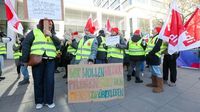The conciliators in the public service have presented a recommendation to end the deadlocked tariff round in the public service of the federal government and municipalities. The proposal provides for two pay increases. The details of the recommendation were announced on Friday noon and affect around 2.5 million employees in the scope of the TVöD. If the tariff parties accept, the term of the new TVöD would be from January 2025 to the end of March 2027.
It is proposed to increase income in two stages: +3 percent on April 1, 2025, and another +2.8 percent on May 1, 2026. The annual special payment for employees of the federal government and municipalities will be increased. Three additional vacation days can be taken by voluntarily waiving part of the annual special payment — with the exception of employees in hospitals and nursing facilities. From 2027, there will be an additional vacation day. A voluntary increase in weekly working hours to up to 42 hours is possible. The allowance for shift work will be increased to 100 euros on July 1, 2025. The allowance for alternating shift work will increase to 200 euros on July 1, 2025. The tariff differences between East and West in the area of the federal government will be aligned.
For trainees, students, and interns, there is also a proposed increase of 75 euros on April 1, 2025, followed by another increase of 75 euros on May 1, 2026. The conciliation recommendation sees a term of 27 months. From April 1, 2025, a linear salary increase of 3 percent, but at least 110 euros per month, is planned. A further salary increase of 2.8 percent is to take place on May 1, 2026.
The conciliation started on March 24, 2025, after the failure of the third round of negotiations. The commission developed the now published proposal in a one-week negotiation phase behind closed doors. The conciliation recommendation is now to be the basis for the final round of negotiations on April 5, 2025, in Potsdam. There, the tariff parties will decide whether to accept the result or if further conflicts will arise.
The proposed wage increase affects all tariff employees in the public service of the federal government and municipalities — including nurses, educators, administrative staff, employees in the federal administration, and savings bank employees in the TVöD. For many employees, this result represents a moderate income increase; however, it falls short of the originally demanded eight percent or a minimum increase of 350 euros per month, as called for by Verdi and the dbb Beamtenbund. It is significantly below the union's demand of 8 percent over a 12-month duration.
According to the second chairman of the conciliation commission, former state councilor Prof. Dr. Henning Lühr, "The conclusion of collective agreements is a complicated and challenging process in the current social situation. After the failure of negotiations, it was possible in conciliation to find a compromise on the key issues of working time and payment. The further development of the sovereign design of individual working hours makes work in the public service more attractive."
Looking ahead, the decision now hinges on the approval of the tariff parties. They are set to meet this weekend to discuss the recommendation again within the framework of the negotiations. Should the recommendation be rejected, widespread strikes in the public service could once again loom. Attention is now focused on April 5, 2025, when unions and employers will meet again in Potsdam.
In the negotiations for higher wages in the public sector, the fronts had hardened. After several warning strikes in daycare centers, administration, and care, the two parties could not agree, necessitating the conciliation. The conciliators have now presented their recommendation, which includes a wage increase in two stages.
The conciliators recommend that employees receive a linear salary increase of three percent from April 1, 2025, but at least 110 euros per month. Stage two would come from May 1, 2026, amounting to 2.8 percent. In addition, the 13th month's salary should increase from 2026. Those who do not work in clinics or nursing homes should be able to exchange parts of this annual special payment for days off. From 2027, employees should receive another day of vacation. From 2026, it should be possible to voluntarily increase weekly working hours to up to 42 hours.
Furthermore, the conciliators recommend better regulations for long-term accounts, flextime, and the working hours of rescue services. From July 1, 2025, allowances for shift work are to be increased to 100 euros and for alternating shift work to 200 euros. The tariff negotiations were declared failed on March 17, 2025, and the unions Verdi and dbb Beamtenbund originally demanded eight percent more money, but at least 350 euros more per month.
The next round is announced for April 5, 2025, in Potsdam. The conciliators emphasized that both sides had to make significant concessions to avoid a labor dispute. The outcome remains uncertain as the final decision rests with the tariff parties, who have been urged to consider the recommendation seriously in light of the ongoing negotiations.
The conciliators' proposal aims to address the pressing needs of public service employees while also considering the financial constraints faced by municipalities and the federal government. As discussions continue, the focus remains on reaching an agreement that balances the interests of both employees and employers.









